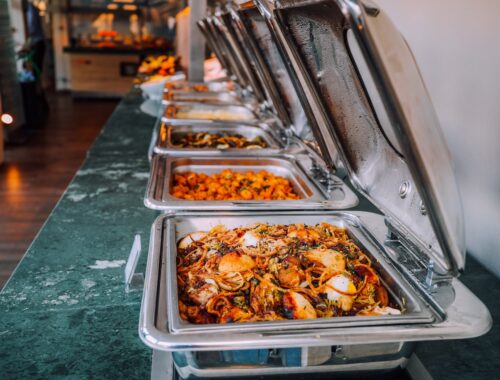
Sustainable Practices in the Restaurant Industry
Restaurants have a unique opportunity to make an impact on our environment. By thinking of sustainable practices like sourcing local ingredients, reducing portion sizes, and setting up composting or recycling systems for leftover food and oil, restaurant owners can help promote a healthier planet while also better serving their communities. With this blog post, we’ll explore the benefits that come with making your restaurant more eco-friendly—and how you can join other businesses in becoming more sustainable in the restaurant industry.
Introducing Farm-to-Table Dining
How to source local ingredients and the benefits of fresh, locally sourced ingredients
Farm-to-table dining is a growing trend in the culinary world that is quickly gaining in popularity. This type of dining involves sourcing ingredients from local suppliers and farmers to provide diners with the freshest, highest-quality food available. By choosing to offer farm-to-table dishes on your menu, not only are you supporting local businesses and farmers, but you’re taking advantage of the numerous benefits that come with using fresh, locally sourced ingredients. Whether you’re a fine dining establishment like Libertango or a more modest chain, you can benefit from sourcing fresh and local ingredients.
Benefits of Farm-to-Table Dining:
- Stronger connection to the community
- Higher level of nutrition
- Fewer resources are used to produce and transport goods
So if you’re a fan of delicious food and sustainable practices, consider giving farm-to-table dining a try and savor the difference in every bite.
Reducing Food Waste
Ways to cut down on portion sizes and what to do with leftovers
Reducing food waste is not only beneficial for the environment but can also save you money. One way to start cutting down on portion sizes is by using smaller plates or measuring out servings to avoid overestimating how much you need. Additionally, planning meals ahead of time in accordance with growing seasons ensures you’re letting fewer foods go to waste.
Composting is another great option for reducing food waste as it allows the organic material to break down naturally and create nutrient-rich soil for plants. By taking small steps to reduce food waste, we can make a big impact on both our wallets and the planet. Western Elite, a company that emphasizes reducing how much waste ends up in landfills, has useful tips for reducing food waste as well as information regarding why it matters.
Recycling & Reusing Kitchen Oils
How to recycle or reuse leftover cooking oils instead of disposing of them
Instead of simply throwing away leftover cooking oils, consider recycling or reusing them in your kitchen. Recycling involves repurposing the oils for industrial purposes such as biodiesel production, while reuse involves using them in your own cooking again. Both methods not only reduce waste but also save you money.
How to Upcycle Cooking Oil:
To recycle your cooking oils, simply collect them in a container and drop them off at a local recycling center. Alternatively, if you choose to reuse your oils, strain them through a fine mesh strainer to remove any food particles and store them in a closed container. You can use the oils again for frying or even as a substitute for butter or olive oil in recipes. By recycling or reusing your kitchen oils, you’ll be doing your part in protecting the environment and preserving your wallet.
Optimizing Energy Consumption
Tips for efficient energy use in restaurants
We get tax breaks for making our homes energy efficient, and the same principle should apply to our businesses. Running a restaurant can be an energy-intensive endeavor, but there are steps you can take to optimize your energy consumption and save money on your utility bills. One easy fix is to switch to energy-efficient LED lighting, which lasts longer and uses less electricity than traditional bulbs.
Another helpful tip is to turn off any appliances that aren’t actively in use, such as the dishwasher or grill, to avoid wasting power. Making these small changes can go a long way in reducing your restaurant’s carbon footprint and keeping your energy costs low. Plus, with the added benefit of prolonging the life of your equipment, it’s a win-win for both your wallet and the environment.
Educating Your Customers About Sustainability
Ways to communicate your green practices and create an eco-friendly culture among customers
If you’re a business that incorporates sustainable practices into your daily operations, it’s important to convey that message to your customers. Not only does it inform them of your efforts to take care of the environment, but it also allows them to join in on the eco-friendly movement.
One way to educate your customers is through social media channels, such as Instagram or Facebook. Post pictures and videos of your green practices in action, and provide detailed captions explaining what you’re doing and why it’s important.
You can also feature your sustainability initiatives on your company website or blog, as well as display signage in your store or office that highlights your green efforts. By communicating your green practices and creating an eco-friendly culture among your customers, you’re not only doing your part to protect the environment, but you’re also attracting like-minded individuals to your brand.
Benefits of Sustainable Practices
Measurable economic savings, customer loyalty, and reduced environmental impact
Sustainability isn’t just a buzzword in the restaurant industry anymore. Implementing sustainable practices not only benefits the environment, but it can also positively impact your bottom line. By reducing energy and water usage, restaurants can see measurable economic savings on their utility bills. Additionally, customers are increasingly aware of and attracted to businesses that commit to being environmentally conscious. This translates to increased customer loyalty and potential new business. With reduced waste and more efficient operations, restaurants can feel good knowing they are doing their part to reduce their environmental impact. At the end of the day, choosing sustainable practices is a win-win for both businesses and the planet.
With sustainability becoming more important than ever, it’s in the best interest of restaurants to prioritize and implement sustainable practices. Eating local, reducing food waste, recycling oil, and educating customers are just some of the ways restaurants can become more eco-friendly. By engaging in these practices, restaurants not only benefit from long-term economic savings and customer loyalty but also serve as an example for other businesses and help reduce their overall environmental impact. Every small effort brings us closer to creating a sustainable future that we can all be proud of. Taking the time to think about how you can bring sustainability into your restaurant could make a lasting difference – for both your business and the world!
You May Also Like

5 Reasons Why Decks and Docks Add Value to Your Property
December 8, 2023
How Your Hot Food Displays Can Impact Customer Satisfaction
June 11, 2023

